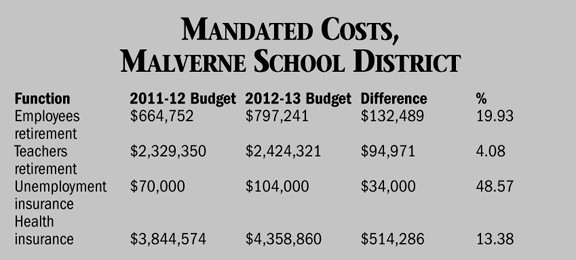Malverne Board of Ed adopts budget
$48.6 million spending plan approved
The Malverne Board of Education unanimously adopted its $48.6 million 2012-13 draft budget last week — an increase of nearly $1.09 million, or 2.29 percent, over the current spending plan.
According to Business Administrator Thomas McDaid, that is the smallest percentage increase in 14 years. The tax levy is $38.6 million, an increase of just under $919,000, or 2.44 percent, which falls below the district’s cap, so the spending plan will need the approval of no more than a simple majority of voters to pass.
McDaid told the Herald that school taxes for a home valued at $343,536 — the district average — would increase by $178 for the year.
He added that school officials worked to create a responsible budget as the district contends with increasing mandated costs, such as health insurance premiums, pension contributions and other expenses (see chart).
“We met with the community numerous times,” McDaid said. “We listened to the community. Cuts needed to be made, and we preserved as much as possible.”
At an April 17 meeting at the Malverne High School library, McDaid explained the budget to more than 40 residents, noting how it would impact district programs, staff and residents’ taxes. It eliminates all summer school programs except the Regents Prep program, as well as all non-instructional field trips, including the $35,000 sixth-grade trip to Frost Valley, in the Catskill Mountain Preserve. Some instructional trips, McDaid said, will remain.
There are also reductions in programs, including art, music and library in the elementary schools, music lessons, K-12 co-curricular activities and clubs, athletic programs for grades seven through 12 and non-mandated elective courses at the high school, which, McDaid said, will be based on enrollment. BOCES services will also be reduced, he added.
Middle school and high school intramural programs will be eliminated, though programs will still be offered at the Maurice W. Downing and Davison Avenue elementary schools. They will be reduced to only one per semester.
“It’s been a long process,” McDaid told residents. “We are not exceeding the cap; we’re going right up to it.” Though there are reductions, he said, core programs remain.






